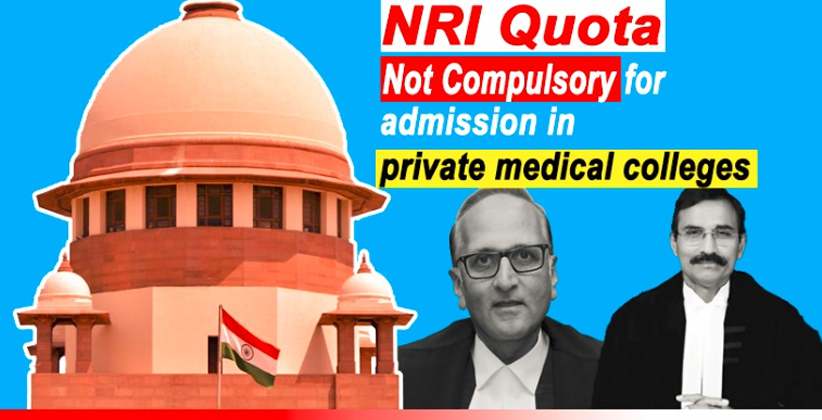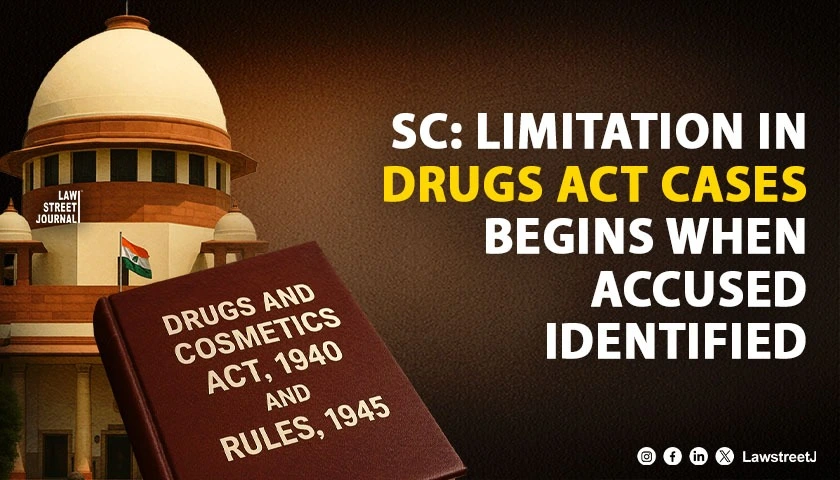The bench of L. Nageswara Rao and S. Ravindra Bhat, JJ has held that the NRI quota for admission to private medical colleges is neither sacrosanct, not inviolable in terms of existence in any given year, or its extent and the same can be done away with it by the state regulating authority by giving reasonable notice of such a decision to enable those aspiring to such seats to choose elsewhere, having regard to the prevailing conditions.
On 17.03.2020, when the NEET PG Medical & Dental Admission/Counselling Board (the Board) convened the meeting attended by representatives of all participating colleges (including private medical colleges offering seats in the postgraduate medical courses in Rajasthan), the unanimous thinking was to offer NRI/Management seats to the extent of 15% of the total admission intake.
When the provisional seat matrix was published on 10.04.2020, it did not indicate that those opting for admission exclusively as NRI candidates would be considered as belonging to any other category.
On 11.04.2020, the private colleges sent their final matrix to the board. This matrix, unbeknown to the NRI candidates, proposed the deletion of the NRI quota.
In the circumstances, when the final matrix was published for each college detailing the quotas for individual disciplines, the original earmarking for NRI candidates was absent.
On 14.04.2020, a notification was issued by the Board stating that that the seat matrix for the current year would not contain the NRI Quota in the private medical colleges of Rajasthan. It read as
Seat Matrix (13.04.2020) available at the website (compiled on the basis of seat information provided by respective colleges) does not have any NRI seat this year. The candidates who have applied for allotment on NRI seats will accordingly be considered based on their remaining eligibility criteria.
The students had argued that having held out to all NRI candidates about the availability of seats for that quota as well as the sequence of filling up those seats, at the penultimate hour, the board could not have decided unilaterally or even permitted colleges unilaterally to withdraw the NRI quota seats altogether.
The counsel appearing for the private colleges, on the other hand, urged that the decision not to offer an NRI quota in medical colleges in the state of Rajasthan was voluntarily and consciously taken, given the extraordinary and unusual situation created by the pandemic. The explanation given by the colleges was that in their assessment, NRI quota seats might not have been filled up to the normal expected levels and in the circumstances, it was more appropriate to merge the seats earmarked for NRI candidates with the management seats.
The accommodation of NRI quota candidates who had opted to be treated as such, in the admission process was transparent and uniform in that all of them were considered on merits for the management quota seats. Thus, there was no real prejudice suffered by such NRI candidates.
Four crucial elements in the NRI quota, per PA Inamdar v. the State of Maharashtra, (2005) 6 SCC 537 are one, the discretion of the management (whether to have the quota or not); two, the limit (15%); three, that seats should be available for genuine and bona fide NRI students, and lastly that the quota was to be filled based on merit. However, there is nothing in PA Inamdar to say that a 15% NRI quota is an unqualified and unalterable part of the admission process in postgraduate medical courses.
On the scope of the discretionary power of private medical colleges on NRI quota
A combined effect of the provisions of the Medical Council of India Act and regulations with respect to admissions (which have been progressively amended in respect of eligibility for admission to courses, the procedure for admission, etc.) and the decisions of this court, is that private colleges and institutions which offer such professional and technical courses have some elbow room: they can decide whether, and to what extent, they wish to offer NRI or management quotas (the limits of which are again defined by either judicial precedents, enacted law or subordinate legislation).
However, the discretion of private managements who set up and manage medical colleges cannot be left to such an untrammeled degree as to result in unfairness to candidates. Undoubtedly, these private institutions have the discretion to factor in an NRI or any other permissible quota. Yet that discretion should be tempered; if the discretion to have such a quota is exercised, it should be revised or modified reasonably, and within a reasonable time.
This case presents some unusual features in that the admission calendar appears to have been thrown out of gear on account of the Covid-19 pandemic. The NEET written test was held in January, and the results were declared on i.e. 31.01.2020. At that stage, and soon thereafter till the end of March, the thinking of the colleges and the board appears to be that the NRI quota in private medical colleges would be maintained (evident from the minutes of meeting dated 17.03.2020).
In terms of the boards notification of 10.04.2020, the NRI students documents were to be verified on 14.04.2020. Apparently, immediately a day after that notification, on 11.04.2020 to be precise, the private colleges en masse appear to have decided not to proceed with the NRI quota and instead merge it with the 35% management quota seats, and proceed to fill them entirely based upon rank based merit of the management quota candidates arranged in terms of their ranking and performance in the NEET. NRI candidates were to be treated as management quota candidates, and their applications too, considered on the basis of their overall merit in that category.
Considering the abovementioned facts, the Court noticed that
Viewed in isolation, this decision is perfectly valid; it gives one the impression that NRI students were not prejudiced. Undoubtedly, the decision to abolish the NRI quota was exclusively within the scope of the private institutions decision-making. Yet what is apparent is that by this time, the NRI students had not only started applying for counseling, but had also submitted all their documents for verification to determine their eligibility for the NRI quota seats, and in a sense, committed themselves as candidates for NRI quota seats in Rajasthan for whatever perceived advantages they could reasonably see in their favor. Hence, when the matter stood thus when the final seat matrices were published on 13.04.2020, it acted to the unfair detriment of these NRI students.
In the circumstances of this case and to do justice to all the parties, the Court directed that a special counseling session should be carried out by the board, confined or restricted to the seats in respect of which admissions were made pursuant to the single judges directions.
The board should ensure participation of the concerned colleges; the counseling shall be a limited one, confined only to the number of seats offered and filled as a result of the single judges judgment.
Such seats shall be offered to the NRI applicants solely on the basis of merit; the seats vacated by such merited students (in the other disciplines) shall then be offered to the beneficiaries of the single judges orders.
If for any reason, such students (i.e. lower down in NRI merit, who are offered seats in other disciplines) do not wish to take up the offer, the college concerned shall refund the fee collected from such students.
The Court also made clear that this special round of counseling should not disturb those admissions, where students had accepted the deletion of the NRI quota, and were accommodated in the management quota, unless they had approached the court at the earliest opportunity, in April 2020, before the judgment of the learned single judge. The entire process shall be completed with a week.
[Nilay Gupta v. Chairman NEET PG Medical and Dental Admission/Counselling Board 2020 and Principal Govt. Dental College, CIVIL APPEAL NO. 3345/2020, decided on 09.10.2020]






